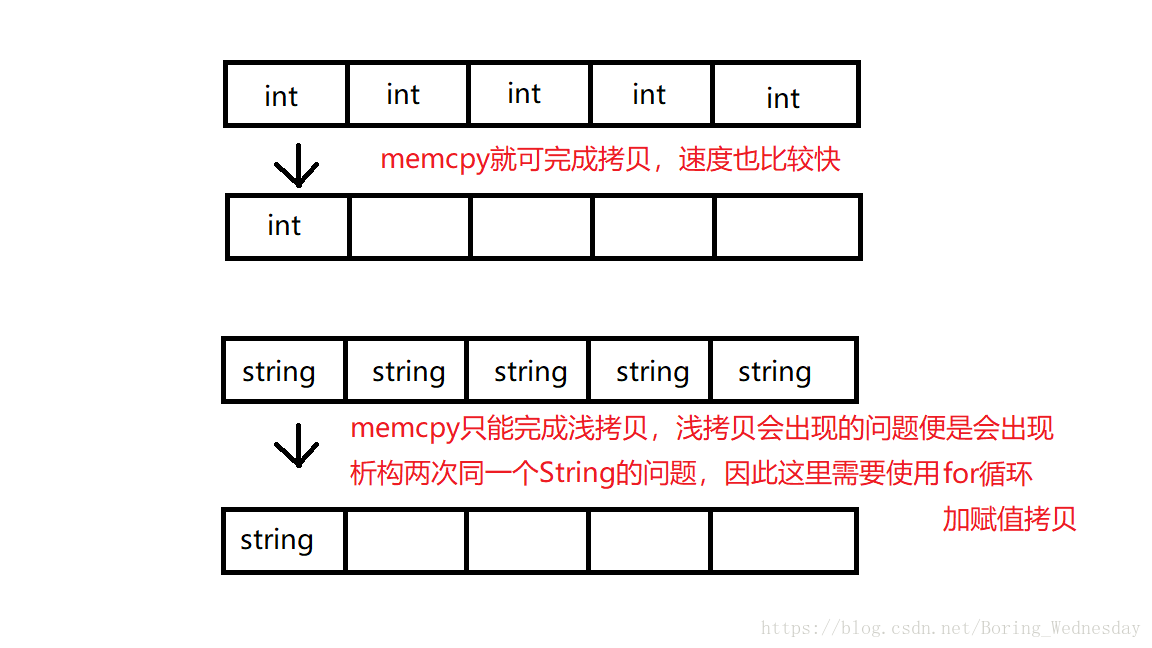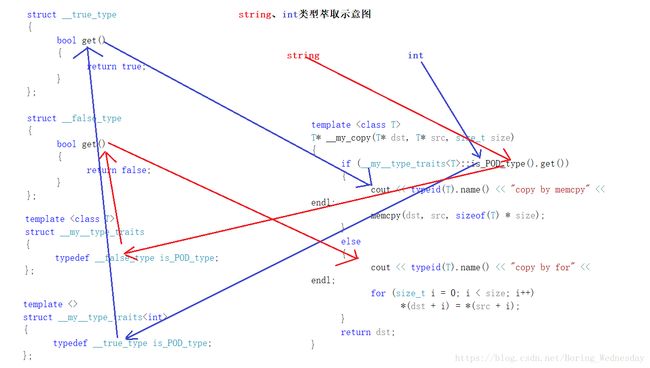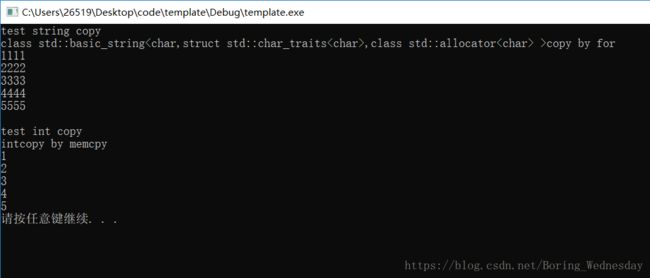- 字符串作为数组和用指针指向的字符串的区别
kfhj
c语言
字符串作为数组和用指针指向的字符串在C语言(以及类似语言如C++)中都有各自的用途和特点。以下是它们之间的主要区别:定义和声明•字符串作为数组:字符串数组是一个字符数组,其中最后一个字符是空字符(’\0’),用于标识字符串的结束。例如:charstr[]=“Hello,World!”;这里,str是一个字符数组,包含了字符串"Hello,World!"和它的结尾空字符。•用指针指向的字符串:字符串
- CMake 开发库(Library)的最佳实践
arong-xu
CMakec++CMake最佳实践
1.使用ModernCMake开发库CMake在C++社区中非常流行,可以说是事实上的C++包管理工具.在MeetingC++开发者调查中,有75.73%的受访者表示自己使用CMake作为构建工具.选择一个广泛流行的工具来打包库意味着你的项目更容易被别人使用.本文将从一个简单的库的打包样例开始,介绍编写CMake的最佳实践.由于CSDN的markdown不支持highlight特定行,有兴趣的读者
- c ++零基础可视化——数组
zhangpz_
算法c++
c++零基础可视化数组一些知识:关于给数组赋值,一个函数为memset,其在cplusplus.com中的描述如下:void*memset(void*ptr,intvalue,size_tnum);Setsthefirstnumbytesoftheblockofmemorypointedbyptrtothespecifiedvalue(interpretedasanunsignedchar).将p
- P3375 【模板】KMP
好好学习^按时吃饭
算法
题目来自洛谷网站:思路:从题目名字知道这是KMP模板题目,对于KMP算法,就两步,1、构造next数组。2、在s1中找到s2出现的位置。KMP代码:#includeusingnamespacestd;constintN=1e6+10;chars1[N],s2[N];//全局变量名字不能定义为next//C++标准库中有一个函数名字是nextintnext1[N];//ne数组intmain(){/
- CentOS7 python安装Ta-lib 0.6.x【talib不能直接安装,必须先安装ta_lib之c++库才可以】
weixin_43343144
服务器运维
正常流程:CentOS7python安装Ta-lib【talib不能直接安装,必须先安装ta_lib之c++库才可以】_centos7安装ta-lib-CSDN博客不同的版本参考如下!参考官方文档:ta-lib·PyPI务必下载匹配版本的【ta-lib-0.6.4-src.tar.gz】才可以正常安装$wgethttps://github.com/ta-lib/ta-lib/releases/do
- 第二十二章: 静态多态与动态多态的衔接_《C++ Templates》notes
郭涤生
c/c++c++开发语言笔记
静态多态与动态多态的衔接核心知识点代码示例与测试用例测试用例输出多选题设计题关键技术总结核心知识点静态多态vs动态多态静态多态:编译期多态,通过模板实现,代码生成效率高,但灵活性差。动态多态:运行期多态,通过虚函数实现,灵活性高,但存在虚表开销。类型擦除(TypeErasure)核心思想:将不同类型的对象统一为通用接口,隐藏具体类型信息。实现方式:通常结合基类指针和模板注册机制。桥接模式(Brid
- jetson nano 实现串口的字节输出
诶我就不告诉你
单片机嵌入式硬件
实现jetosnnano的字节输出,但是存在一定的问题主要为在制作数据包的过程中,我遇到了当输出字节为0x0a的情况下串口会连续输出0x0d0x0a这时候需要在串口部分进行一定的配置防止自动换行的输出/*防止自动换行*/opt.c_oflag&=~OPOST;//禁用输出处理标志,防止自动转换换行符感谢博主JetsonNano入坑之路----(10)C/C++语言读写UART或USB串口数据_je
- C++在线OJ负载均衡项目
平凡的小y
c++开发语言
1.演示项目项目源码链接:2.项目所用技术和开发环境所用技术C++STL标准库Boost准标准库(字符串切割)cpp-httplib第三方开源网络库ctemplate第三方开源前端网页渲染库jsoncpp第三方开源序列化、反序列化库负载均衡设计MySQLCconnectAce前端在线编辑器html/css/js/jquery/ajax开发环境Ubuntu云服务器vscodeMysqlWorkben
- C++:函数指针进阶(三):Lambda函数详解:概念详解
FishAnd_Yu
#C++精华c++C++Lamdba
1:Lambda函数语法C++语法的基本格式为:[capture](parameters)->return_type{/*...*/}(1)[capture]:[]内为外部变量的传递方式,值、引用等,如下[]//表示的是在lambda定义之前的域,对外部参数的调用;[=]//表示外部参数直接传值[&]//表示外部参数传引用,可修改值。当默认捕获符是&时,后继的简单捕获符必须不以&开始。而当默认捕获
- 于STM32F103C8T6的智能灯泡控制系统C++源码实现
程序员Thomas
STM32单片机智能灯泡stm32c++嵌入式硬件
以下是一个基于STM32F103C8T6的智能灯泡控制系统C++源码实现,整合了PWM调光、WiFi控制和环境感知功能。该代码已在STM32CubeIDE中验证,支持直接烧录运行:#include"main.h"#include#include"wifi.h"//LED设备抽象类(3设计)classLEDDevice{protected:TIM_HandleTypeDef*pwmTimer;uin
- 基于STM32的平衡车外设控制应用案例,提供C++源码
程序员Thomas
STM32单片机平衡车stm32c++单片机
基于STM32的平衡车外设控制应用案例**下面是一个使用STM32控制平衡车的简单应用案例,包含姿态传感器读取、电机控制和串口通信功能。主要功能使用MPU6050传感器读取姿态数据使用PID控制器调整平衡车姿态通过串口输出调试信息电机速度控制C++源代码#include"stm32f10x.h"#include//定义常量#definePWM_MIN1000#definePWM_MAX2000#d
- 深入理解C++中的std::string::substr成员函数:子串操作的艺术
星途码客
c++c++开发语言
引言在C++编程中,字符串处理是一项常见且重要的任务。std::string类作为C++标准库中的一部分,提供了丰富的成员函数来支持字符串的各种操作,其中substr成员函数在获取字符串子串方面扮演着关键角色。本文将深入探讨std::string::substr函数的工作原理、使用方法、异常处理以及性能考量,帮助读者全面掌握这一强大的字符串处理工具。题目:探索C++std::string::sub
- npm error gyp info
计算机辅助工程
npm前端node.js
在使用npm安装Node.js包时,可能会遇到各种错误,其中gyp错误是比较常见的一种。gyp是Node.js的一个工具,用于编译C++代码。这些错误通常发生在需要编译原生模块的npm包时。下面是一些常见的原因和解决方法:常见原因及解决方法Python未安装或版本不兼容:Node.js使用Python来运行gyp。确保你的系统上安装了Python,并且版本与node-gyp兼容。通常推荐使用Pyt
- C++缺省参数函数重载
ConFig.
c++算法数据结构
缺省参数大家知道什么是备胎吗?C++中函数的参数也可以配备胎。3.1缺省参数概念缺省参数是声明或定义函数时为函数的参数指定一个默认值。在调用该函数时,如果没有指定实参则采用该默认值,否则使用指定的实参。voidTestFunc(inta=0){cout_a=(int*)malloc(sizeof(int)*capacity);ps->_top=0;ps->_capacity=capacity;}i
- L2-050懂蛇语c++(pta天梯赛。测试点1。)
zzy678
c++
这个题目看上去还挺简单的,但是自己做的时候就超时了一开始只有19分。我自己stl学的不是很好,然后一开始自己用的pair和vector一起写的发现了一些小问题改了之后才得19。。。其中两个就是超时问题。可能查找太慢?之后又查看了一些别人写的,参考了使用map和vector混用的方法就很好过了,但是那个测试点1就是过不了。最后,我发现就是首字的处理方式应该优化。一个小小小坑。大家注意。#includ
- C语言_数据结构总结8:链式队列
*.✧屠苏隐遥(ノ◕ヮ◕)ノ*.✧
C语言—数据结构数据结构c语言开发语言visualstudiovisualstudio链表
纯C语言实现,不涉及C++链队列队列的链式表示称为链队列,它实际上是一个同时具有队头指针和队尾指针的单链表,头指针指向对头结点,尾指针指向队尾结点。头结点是链式队列中的特殊结点,通常不存储实际的队列元素数据,其主要作用是方便对队列的操作,例如在进行入队、出队操作时,可以统一操作逻辑,无需特殊处理队列为空的情况。它作为队列的头部标识,其next指针指向队列中的第一个真正存储数据的结点。尾结点(注意区
- C语言_数据结构总结10:二叉树的递归/非递归遍历
*.✧屠苏隐遥(ノ◕ヮ◕)ノ*.✧
C语言—数据结构数据结构算法链表visualstudiovisualstudioc语言b树
纯C语言实现,不涉及C++遍历是二叉树各种操作的基础,例如对于一棵给定二叉树求结点的双亲/求结点的孩子/求二叉树的高度/求叶结点个数/判断两棵二叉树是否相等……所有这些操作都是在二叉树遍历的过程中进行的。因此必须掌握二叉树的各种遍历过程,并能灵活用以解决各种问题。常见的遍历次序有:先序,中序,后序->其中“序”是指根结点何时被访问。先序:根结点->左子树->右子树中序:左子树->根结点->右子树后
- 编译链接过程
YancyKahn
编译链接编译链接GCC
编译链接过程C/C++程序从文本到可执行文件之间是一个复杂的过程.对于源代码(.c/.cpp)文件我们是不能直接运行的,必须经过一系列的处理才能转化为机器语言,再通过链接相应的文件转化为可执行程序.这个过程称为编译链接过程.本文篇幅较长,想直接看分析过程点击这里下面是从源代码到可执行文件的整个编译链接的过程:整个编译链接过程无非就分为编译过程和链接过程1.编译过程C文件编译过程又可分为:编译和汇编
- 第十八章:模板的多态力量_《C++ Templates》notes
郭涤生
c/c++c++开发语言笔记
模板的多态力量一、动态多态vs静态多态二、奇异递归模板模式(CRTP)三、策略模式(编译期策略选择)关键要点总结第一部分:多选题(10题)第二部分:设计题(5题)答案与详解多选题答案:设计题参考答案1.编译期策略选择器2.类型安全访问者模式3.概念约束数学库4.编译期工厂模式5.静态多态容器测试说明一、动态多态vs静态多态核心概念:动态多态:基于虚函数和继承体系,函数调用在运行时决定(通过虚函数表
- CPP编译与链接过程
阿斯顿的风格
c++开发语言ubuntulinuxbash编译汇编
1.概述在C++中,从源代码(.cpp文件)到最终可执行程序,需要经历以下四个主要阶段:预处理(Preprocessing)编译(Compilation)汇编(Assembly)链接(Linking)2.预处理预处理阶段是编译流程的第一步,主要处理以#开头的指令,包括宏定义、文件包含以及条件编译等。2.1文件包含(#include)工作原理:当预处理器遇到#include指令时,会在文件系统中查找
- 第十七章:Future Directions_《C++ Templates》notes
郭涤生
c/c++c++开发语言笔记
FutureDirections核心重难点:示例代码:设计题多选题答案设计题详解核心重难点:泛型非类型模板参数允许任意类型作为非类型模板参数(如template)需解决类型推导和链接问题编译期控制流constexprif替代模板偏特化(减少代码膨胀)折叠表达式优化可变参数模板处理反射与元编程增强类型检查(is_convertible_v等)反射提案(如成员变量/函数查询)模块化支持解决传统头文件包
- 访问者模式【行为模式C++】
GoWjw
设计模式访问者模式
1.概述访问者模式是一种行为设计模式,它能将算法与其所作用的对象隔离开来。访问者模式主要解决的是数据与算法的耦合问题,尤其是在数据结构比较稳定,而算法多变的情况下。为了不污染数据本身,访问者会将多种算法独立归档,并在访问数据时根据数据类型自动切换到对应的算法,实现数据的自动响应机制,并确保算法的自由扩展。访问者模式在实际开发中使用的非常少,因为它比较难以实现并且应用该模式肯能会导致代码的可读性变差
- 【分治法】最接近点对问题 C++(附代码分析及实例)
haaaaaaarry
算法设计与分析算法
问题描述给定平面上n个点,找其中的一对点,使得在n个点组成的所有点对中,该点对间的距离最小问题分析先考虑一下一维情况下,取中间某个点m,将所有点划分为两个集合,递归的找出左右集合的最接近点对,最后再和最靠近点m的左右两点间的距离作比较,最小的就是整个点对中最接近的现在将一维的情况扩展到二维,二维比一维复杂的地方在于每个点都有两个坐标,我们用一条直线l将平面上的所有点同样分成两个集合,再递归的去两个
- 浅谈VB.NET为何还没有被时代淘汰
练习AI两年半
.net
最近在做一个旧项目的更新和维护,比较头疼的是这个项目是08年写的,当时编写编写语言为c++、环境为vc6.0+MFC(嘶~,这玩意儿年纪比我还大),需要将环境改为VS2022、.NET框架,为配合项目组其他同事,新语言改用VB.NET。我之前一直在用C++和QT写项目,一时间让我换一种语言和框架,还要在c++和vb.net之间反复横跳确实让我很崩溃。但打工人再难的项目也要硬着头皮上呀,好在VB.N
- conda install 和 pip install 的区别
不知江月待何人..
深度学习
condainstall和pipinstall是两个常用的包安装命令,但它们在很多方面存在差异。1.所属管理系统不同1.1condainstallcondainstall是Anaconda和Miniconda发行版自带的包管理工具conda的安装命令。conda是一个跨平台的开源包管理系统和环境管理系统,它不仅可以管理Python包,还能管理其他语言(如R、C++等)的包。conda更侧重于数据科
- 在 C 和 C++ 编程里,要引用一个文件中的函数,包含头文件和使用extern,通常包含头文件是更好的做法
weixin_44799641
C/C++c语言c++
在C和C++编程里,要引用一个文件中的函数,通常包含头文件是更好的做法,下面为你详细分析:包含头文件优点代码清晰规范:在源文件里包含函数声明所在的头文件,能让代码结构更清晰,其他人阅读代码时能很容易明白函数的来源和用途。比如,#include"can_port.h"这样的语句明确表示该源文件要使用can_port.h头文件里声明的函数。自动更新声明:要是函数的声明有变动,只需修改头文件,所有包含该
- C++ 地图 + 配对组合!3 分钟吃透 map 和 pair 的黄金搭档
Reese_Cool
STL数据结构与算法c++算法开发语言stl
文章目录pair一、基本概念二、pair的声明与初始化三、成员访问与修改四、常用操作1.比较运算2.交换值3.tie函数(解包pair)五、pair的应用场景六、pair与结构体/类的对比七、pair与tuple的对比八、代码示例1.返回多个值2.存储键值对九、总结map一、基本概念二、map的声明与初始化三、常用操作四、map的应用场景五、注意事项在C++编程里,map和pair是标准库中十分实
- 第十六章:Specialization and Overloading_《C++ Templates》notes
郭涤生
c/c++c++开发语言笔记
SpecializationandOverloading一、模板特化与重载的核心概念二、代码实战与测试用例三、关键知识点总结四、进阶技巧五、实践建议多选题设计题代码测试说明一、模板特化与重载的核心概念函数模板重载(FunctionTemplateOverloading)//基础模板templateTmax(Ta,Tb){returna>b?a:b;}//显式特化(FullSpecializatio
- AtCoder备赛冲刺必刷题(C++) | 洛谷 AT_abc396_a Triple Four
热爱编程的通信人
c++算法开发语言
本文分享的必刷题目是从蓝桥云课、洛谷、AcWing等知名刷题平台精心挑选而来,并结合各平台提供的算法标签和难度等级进行了系统分类。题目涵盖了从基础到进阶的多种算法和数据结构,旨在为不同阶段的编程学习者提供一条清晰、平稳的学习提升路径。欢迎大家订阅我的专栏:算法题解:C++与Python实现!附上汇总贴:算法竞赛备考冲刺必刷题(C++)|汇总【题目来源】洛谷:AT_abc396_a[ABC396A]
- C/C++数据类型--整型类型
蓝心湄
C/C++数据类型c语言
概念数据类型表示的是数据的身份决定它可以进行什么操作、占用多少空间与数据结构的区别数据类型更倾向于表示数据的身份数据结构表示的是怎么操作数据(是在类型的基础上进行对数据的操作的)C语言允许使用的类型类型的分类算术类型:基本类型和枚举类型纯量类型:算术类型和指针类型组合类型:数组类型和结构体类型整型数据基本整型(int)长度为2字节或4字节短整型(shortint)长度为2字节长整型(longint
- TOMCAT在POST方法提交参数丢失问题
357029540
javatomcatjsp
摘自http://my.oschina.net/luckyi/blog/213209
昨天在解决一个BUG时发现一个奇怪的问题,一个AJAX提交数据在之前都是木有问题的,突然提交出错影响其他处理流程。
检查时发现页面处理数据较多,起初以为是提交顺序不正确修改后发现不是由此问题引起。于是删除掉一部分数据进行提交,较少数据能够提交成功。
恢复较多数据后跟踪提交FORM DATA ,发现数
- 在MyEclipse中增加JSP模板 删除-2008-08-18
ljy325
jspxmlMyEclipse
在D:\Program Files\MyEclipse 6.0\myeclipse\eclipse\plugins\com.genuitec.eclipse.wizards_6.0.1.zmyeclipse601200710\templates\jsp 目录下找到Jsp.vtl,复制一份,重命名为jsp2.vtl,然后把里面的内容修改为自己想要的格式,保存。
然后在 D:\Progr
- JavaScript常用验证脚本总结
eksliang
JavaScriptjavaScript表单验证
转载请出自出处:http://eksliang.iteye.com/blog/2098985
下面这些验证脚本,是我在这几年开发中的总结,今天把他放出来,也算是一种分享吧,现在在我的项目中也在用!包括日期验证、比较,非空验证、身份证验证、数值验证、Email验证、电话验证等等...!
&nb
- 微软BI(4)
18289753290
微软BI SSIS
1)
Q:查看ssis里面某个控件输出的结果:
A MessageBox.Show(Dts.Variables["v_lastTimestamp"].Value.ToString());
这是我们在包里面定义的变量
2):在关联目的端表的时候如果是一对多的关系,一定要选择唯一的那个键作为关联字段。
3)
Q:ssis里面如果将多个数据源的数据插入目的端一
- 定时对大数据量的表进行分表对数据备份
酷的飞上天空
大数据量
工作中遇到数据库中一个表的数据量比较大,属于日志表。正常情况下是不会有查询操作的,但如果不进行分表数据太多,执行一条简单sql语句要等好几分钟。。
分表工具:linux的shell + mysql自身提供的管理命令
原理:使用一个和原表数据结构一样的表,替换原表。
linux shell内容如下:
=======================开始
- 本质的描述与因材施教
永夜-极光
感想随笔
不管碰到什么事,我都下意识的想去探索本质,找寻一个最形象的描述方式。
我坚信,世界上对一件事物的描述和解释,肯定有一种最形象,最贴近本质,最容易让人理解
&
- 很迷茫。。。
随便小屋
随笔
小弟我今年研一,也是从事的咱们现在最流行的专业(计算机)。本科三流学校,为了能有个更好的跳板,进入了考研大军,非常有幸能进入研究生的行业(具体学校就不说了,怕把学校的名誉给损了)。
先说一下自身的条件,本科专业软件工程。主要学习就是软件开发,几乎和计算机没有什么区别。因为学校本身三流,也就是让老师带着学生学点东西,然后让学生毕业就行了。对专业性的东西了解的非常浅。就那学的语言来说
- 23种设计模式的意图和适用范围
aijuans
设计模式
Factory Method 意图 定义一个用于创建对象的接口,让子类决定实例化哪一个类。Factory Method 使一个类的实例化延迟到其子类。 适用性 当一个类不知道它所必须创建的对象的类的时候。 当一个类希望由它的子类来指定它所创建的对象的时候。 当类将创建对象的职责委托给多个帮助子类中的某一个,并且你希望将哪一个帮助子类是代理者这一信息局部化的时候。
Abstr
- Java中的synchronized和volatile
aoyouzi
javavolatilesynchronized
说到Java的线程同步问题肯定要说到两个关键字synchronized和volatile。说到这两个关键字,又要说道JVM的内存模型。JVM里内存分为main memory和working memory。 Main memory是所有线程共享的,working memory则是线程的工作内存,它保存有部分main memory变量的拷贝,对这些变量的更新直接发生在working memo
- js数组的操作和this关键字
百合不是茶
js数组操作this关键字
js数组的操作;
一:数组的创建:
1、数组的创建
var array = new Array(); //创建一个数组
var array = new Array([size]); //创建一个数组并指定长度,注意不是上限,是长度
var arrayObj = new Array([element0[, element1[, ...[, elementN]]]
- 别人的阿里面试感悟
bijian1013
面试分享工作感悟阿里面试
原文如下:http://greemranqq.iteye.com/blog/2007170
一直做企业系统,虽然也自己一直学习技术,但是感觉还是有所欠缺,准备花几个月的时间,把互联网的东西,以及一些基础更加的深入透析,结果这次比较意外,有点突然,下面分享一下感受吧!
&nb
- 淘宝的测试框架Itest
Bill_chen
springmaven框架单元测试JUnit
Itest测试框架是TaoBao测试部门开发的一套单元测试框架,以Junit4为核心,
集合DbUnit、Unitils等主流测试框架,应该算是比较好用的了。
近期项目中用了下,有关itest的具体使用如下:
1.在Maven中引入itest框架:
<dependency>
<groupId>com.taobao.test</groupId&g
- 【Java多线程二】多路条件解决生产者消费者问题
bit1129
java多线程
package com.tom;
import java.util.LinkedList;
import java.util.Queue;
import java.util.concurrent.ThreadLocalRandom;
import java.util.concurrent.locks.Condition;
import java.util.concurrent.loc
- 汉字转拼音pinyin4j
白糖_
pinyin4j
以前在项目中遇到汉字转拼音的情况,于是在网上找到了pinyin4j这个工具包,非常有用,别的不说了,直接下代码:
import java.util.HashSet;
import java.util.Set;
import net.sourceforge.pinyin4j.PinyinHelper;
import net.sourceforge.pinyin
- org.hibernate.TransactionException: JDBC begin failed解决方案
bozch
ssh数据库异常DBCP
org.hibernate.TransactionException: JDBC begin failed: at org.hibernate.transaction.JDBCTransaction.begin(JDBCTransaction.java:68) at org.hibernate.impl.SessionImp
- java-并查集(Disjoint-set)-将多个集合合并成没有交集的集合
bylijinnan
java
import java.util.ArrayList;
import java.util.Arrays;
import java.util.HashMap;
import java.util.HashSet;
import java.util.Iterator;
import java.util.List;
import java.util.Map;
import java.ut
- Java PrintWriter打印乱码
chenbowen00
java
一个小程序读写文件,发现PrintWriter输出后文件存在乱码,解决办法主要统一输入输出流编码格式。
读文件:
BufferedReader
从字符输入流中读取文本,缓冲各个字符,从而提供字符、数组和行的高效读取。
可以指定缓冲区的大小,或者可使用默认的大小。大多数情况下,默认值就足够大了。
通常,Reader 所作的每个读取请求都会导致对基础字符或字节流进行相应的读取请求。因
- [天气与气候]极端气候环境
comsci
环境
如果空间环境出现异变...外星文明并未出现,而只是用某种气象武器对地球的气候系统进行攻击,并挑唆地球国家间的战争,经过一段时间的准备...最大限度的削弱地球文明的整体力量,然后再进行入侵......
那么地球上的国家应该做什么样的防备工作呢?
&n
- oracle order by与union一起使用的用法
daizj
UNIONoracleorder by
当使用union操作时,排序语句必须放在最后面才正确,如下:
只能在union的最后一个子查询中使用order by,而这个order by是针对整个unioning后的结果集的。So:
如果unoin的几个子查询列名不同,如
Sql代码
select supplier_id, supplier_name
from suppliers
UNI
- zeus持久层读写分离单元测试
deng520159
单元测试
本文是zeus读写分离单元测试,距离分库分表,只有一步了.上代码:
1.ZeusMasterSlaveTest.java
package com.dengliang.zeus.webdemo.test;
import java.util.ArrayList;
import java.util.List;
import org.junit.Assert;
import org.j
- Yii 截取字符串(UTF-8) 使用组件
dcj3sjt126com
yii
1.将Helper.php放进protected\components文件夹下。
2.调用方法:
Helper::truncate_utf8_string($content,20,false); //不显示省略号 Helper::truncate_utf8_string($content,20); //显示省略号
&n
- 安装memcache及php扩展
dcj3sjt126com
PHP
安装memcache tar zxvf memcache-2.2.5.tgz cd memcache-2.2.5/ /usr/local/php/bin/phpize (?) ./configure --with-php-confi
- JsonObject 处理日期
feifeilinlin521
javajsonJsonOjbectJsonArrayJSONException
写这边文章的初衷就是遇到了json在转换日期格式出现了异常 net.sf.json.JSONException: java.lang.reflect.InvocationTargetException 原因是当你用Map接收数据库返回了java.sql.Date 日期的数据进行json转换出的问题话不多说 直接上代码
&n
- Ehcache(06)——监听器
234390216
监听器listenerehcache
监听器
Ehcache中监听器有两种,监听CacheManager的CacheManagerEventListener和监听Cache的CacheEventListener。在Ehcache中,Listener是通过对应的监听器工厂来生产和发生作用的。下面我们将来介绍一下这两种类型的监听器。
- activiti 自带设计器中chrome 34版本不能打开bug的解决
jackyrong
Activiti
在acitivti modeler中,如果是chrome 34,则不能打开该设计器,其他浏览器可以,
经证实为bug,参考
http://forums.activiti.org/content/activiti-modeler-doesnt-work-chrome-v34
修改为,找到
oryx.debug.js
在最头部增加
if (!Document.
- 微信收货地址共享接口-终极解决
laotu5i0
微信开发
最近要接入微信的收货地址共享接口,总是不成功,折腾了好几天,实在没办法网上搜到的帖子也是骂声一片。我把我碰到并解决问题的过程分享出来,希望能给微信的接口文档起到一个辅助作用,让后面进来的开发者能快速的接入,而不需要像我们一样苦逼的浪费好几天,甚至一周的青春。各种羞辱、谩骂的话就不说了,本人还算文明。
如果你能搜到本贴,说明你已经碰到了各种 ed
- 关于人才
netkiller.github.com
工作面试招聘netkiller人才
关于人才
每个月我都会接到许多猎头的电话,有些猎头比较专业,但绝大多数在我看来与猎头二字还是有很大差距的。 与猎头接触多了,自然也了解了他们的工作,包括操作手法,总体上国内的猎头行业还处在初级阶段。
总结就是“盲目推荐,以量取胜”。
目前现状
许多从事人力资源工作的人,根本不懂得怎么找人才。处在人才找不到企业,企业找不到人才的尴尬处境。
企业招聘,通常是需要用人的部门提出招聘条件,由人
- 搭建 CentOS 6 服务器 - 目录
rensanning
centos
(1) 安装CentOS
ISO(desktop/minimal)、Cloud(AWS/阿里云)、Virtualization(VMWare、VirtualBox)
详细内容
(2) Linux常用命令
cd、ls、rm、chmod......
详细内容
(3) 初始环境设置
用户管理、网络设置、安全设置......
详细内容
(4) 常驻服务Daemon
- 【求助】mongoDB无法更新主键
toknowme
mongodb
Query query = new Query(); query.addCriteria(new Criteria("_id").is(o.getId())); &n
- jquery 页面滚动到底部自动加载插件集合
xp9802
jquery
很多社交网站都使用无限滚动的翻页技术来提高用户体验,当你页面滑到列表底部时候无需点击就自动加载更多的内容。下面为你推荐 10 个 jQuery 的无限滚动的插件:
1. jQuery ScrollPagination
jQuery ScrollPagination plugin 是一个 jQuery 实现的支持无限滚动加载数据的插件。
2. jQuery Screw
S



